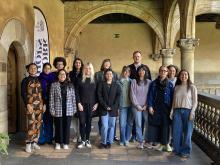Sexual and Reproductive Health and Rights (SRHR) under the Spectrum of Sex, Gender and Sexuality
Coordinators: Nikoletta Pikramenou (University of Warsaw), Marta Bucholc (University of Warsaw), Barbara Giovanna Bello (Università degli Studi della Tuscia)
Description of the meeting
Rationale: SRHR are not conceived as independent human rights; but are related to multiple human rights, including the right to life, the right to be free from torture, the right to health, the prohibition of discrimination. Under human rights law, states have an obligation to take effective measures to protect SRHR as they are key to equal and gender-diverse societies and economies (see EP resolution, 2021). Nonetheless, access to SRHR is often impeded by law or by de facto inequality and discrimination on the basis of sexual orientation, gender identity and expression, sex characteristics (SOGIESC) and other intersecting grounds (see UN, 2015 and 2020). Feminist scholars have been challenging the assumption of gender neutrality of the law, exposing the hidden effects of laws that do not explicitly discriminate on the basis of SOGIESC, and examining how social structures reinforce norms that implicitly subordinate women as women and across intersections. Furthermore, structural barriers to SRHR are under-researched, in terms of empirical research that goes beyond the needs of white, cis-gender, straight women.
Thematic scope: This workshop aims to explore how SRHR frameworks are materialised against the backdrop of diversity along the lines of sex, gender and sexuality in societies; while examining how such diversity affects or in some cases could even limit the design, understanding and implementation of current SRHR frameworks. To shed light on these interconnections, we are seeking presentations that combine SRHR issues with women in all their diversity as well as LGBTQI people. We are planning to cover a range of SRHR themes such as the right to health, to life, to privacy, non-discrimination and freedom from torture, structural inequalities, societal barriers, reproductive justice, the role of governments, social movements including anti-gender movements by adopting an intersectional lens. Contributions that aim to combine sex, gender and sexuality with more intersectional factors, such as class, migration status, religion, ethnicity, disability are also welcome.
Structure: A 2 day interdisciplinary workshop, comprising 5 sessions total.
Contribution: This workshop aims to discuss the understanding of law and the legal system as a social formation, which is an inherent part of socio-legal research. Secondly, it takes a ‘law in action’ approach to explore the contextual facts that prevent the effectiveness of law and/or lead to judicial decisions on reproductive rights and health. Finally, an equally important part is to discuss the tensions and interactions between equality and diversity in law and society.
Our experience in Oñati
I was a visiting scholar few years ago at IISL and I had the pleasure of meeting other scholars from around the world. I am happy that in 2025, together with Barbara Bello, whom I met at IISJ and Marta Bucholc we were given the opportunity and space to ogranise a workshop on gender that goes beyond and embraces multiple concepts including intersectionality. The IISL team helped us immensely with the logistics of the workshop and made sure to accommodate our needs even when exceptional circumstances occurred. A big thank you and cheers to -many more- future workshops!
Workshop Coordination Team
Avenida de la Universidad, 8
Apartado 28
20560 Oñati (Gipuzkoa) - Spain
T: +34 943 78... Ver teléfono
E: workshop@iisj.es




